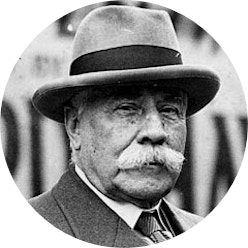
Эдуард Элгар
2 июня 1857 г. - Broadheath (United Kingdom) — 23 февраля 1934 г. - Worcester (United Kingdom)
About
Эдвард Элгар, самоучка
Эдвард Элгар, композитор знаменитого Pomp and Circumstance, был первым «прогрессивным» британским композитором, по словам Рихарда Штрауса, который дирижировал его музыкой в 1901 году. Он дебютировал под покровительством своего отца-органиста в скромных музыкальных условиях в центре английской сельской местности. Действительно, молодой человек никогда не забывал красоту английской природы: его работы свидетельствуют об этом. Ни музыкальная школа, ни покровительство не направляли Элгара. Он просто активно участвовал в местной музыкальной жизни и как самоучка всегда сохранял простой и чувствительный характер, далекий от претензий любой официальной карьеры.
Он начал сочинять музыку только в возрасте тридцати двух лет, и его первые произведения были неуклюжими и задуманными как продолжение романтической музыки. Решительный композитор дебютировал в Лондоне в 1897 году с Imperial March, который имел успех. В возрасте сорока лет он достиг славы. Enigma Variations и Sea Pictures показали величие его музыкального видения. Официальные заказы последовали один за другим, и Эдвард Элгар, избегая всякой вульгарности, создавал популярную музыку, а также некоторые шедевры, такие как его Концерт для скрипки и Симфония № 2 (1911).
Работы Элгара
Эдвард Элгар сумел проникнуть в самые страстные и интимные секреты и примирить чувствительность Брамса и Брукнера. Британцы считают Элгара одним из величайших композиторов со времен Генри Перселла. Он проложил путь для Ральфа Воан-Уильямса.

